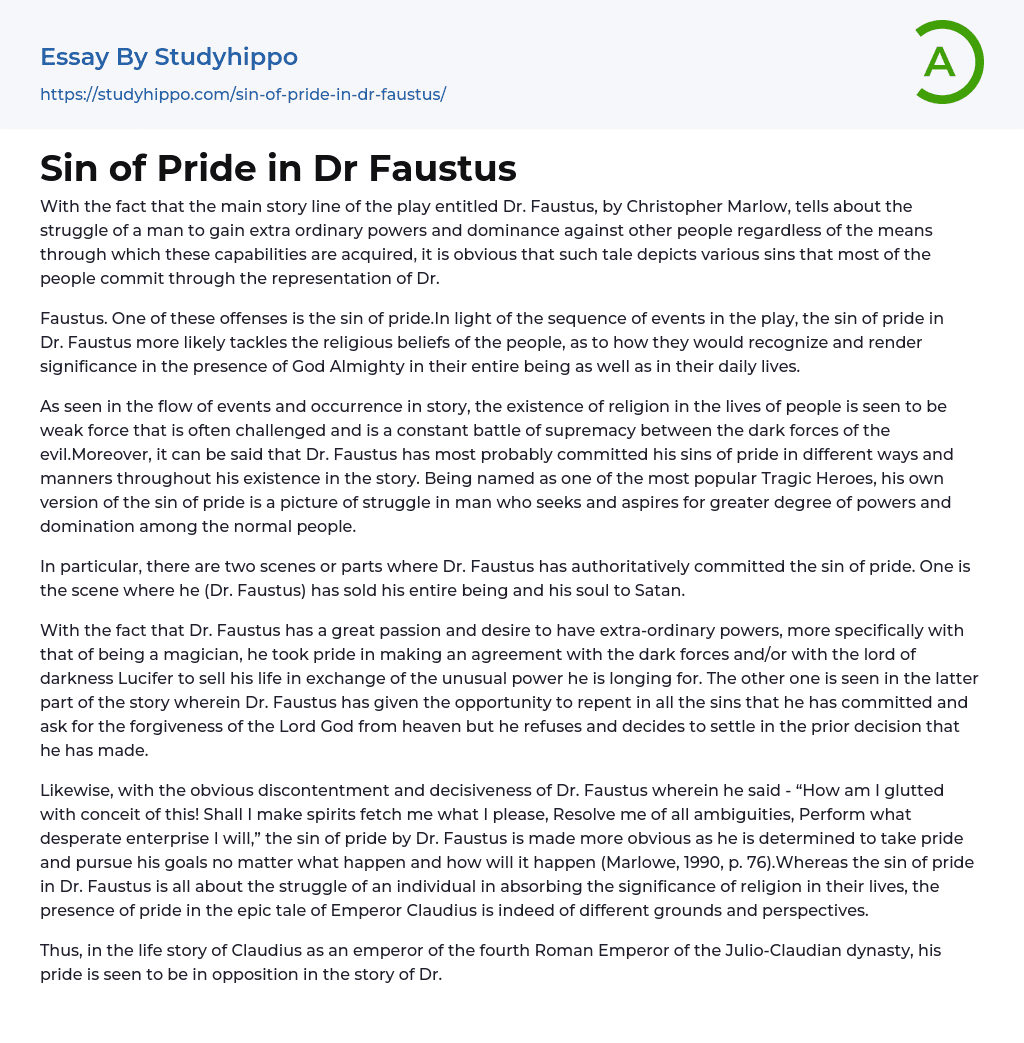With the fact that the main story line of the play entitled Dr. Faustus, by Christopher Marlow, tells about the struggle of a man to gain extra ordinary powers and dominance against other people regardless of the means through which these capabilities are acquired, it is obvious that such tale depicts various sins that most of the people commit through the representation of Dr.
Faustus. One of these offenses is the sin of pride.In light of the sequence of events in the play, the sin of pride in Dr. Faustus more likely tackles the religious beliefs of the people, as to how they would recognize and render significance in the presence of God Almighty in their entire being as well as in their daily lives.
As seen in the flow of events and occurrence in story, the e
...xistence of religion in the lives of people is seen to be weak force that is often challenged and is a constant battle of supremacy between the dark forces of the evil.Moreover, it can be said that Dr. Faustus has most probably committed his sins of pride in different ways and manners throughout his existence in the story. Being named as one of the most popular Tragic Heroes, his own version of the sin of pride is a picture of struggle in man who seeks and aspires for greater degree of powers and domination among the normal people.
In particular, there are two scenes or parts where Dr. Faustus has authoritatively committed the sin of pride. One is the scene where he (Dr. Faustus) has sold his entire being and his soul to Satan.
With the fact that Dr. Faustus has a
great passion and desire to have extra-ordinary powers, more specifically with that of being a magician, he took pride in making an agreement with the dark forces and/or with the lord of darkness Lucifer to sell his life in exchange of the unusual power he is longing for. The other one is seen in the latter part of the story wherein Dr. Faustus has given the opportunity to repent in all the sins that he has committed and ask for the forgiveness of the Lord God from heaven but he refuses and decides to settle in the prior decision that he has made.
Likewise, with the obvious discontentment and decisiveness of Dr. Faustus wherein he said - “How am I glutted with conceit of this! Shall I make spirits fetch me what I please, Resolve me of all ambiguities, Perform what desperate enterprise I will,” the sin of pride by Dr. Faustus is made more obvious as he is determined to take pride and pursue his goals no matter what happen and how will it happen (Marlowe, 1990, p. 76).Whereas the sin of pride in Dr. Faustus is all about the struggle of an individual in absorbing the significance of religion in their lives, the presence of pride in the epic tale of Emperor Claudius is indeed of different grounds and perspectives.
Thus, in the life story of Claudius as an emperor of the fourth Roman Emperor of the Julio-Claudian dynasty, his pride is seen to be in opposition in the story of Dr. Faustus. As earlier regarded to be one of the most unlikely emperors to have ever ruled in a Roman Empire, Emperor Claudius has
used his pride in such a good manner and meaning.Despite the fact that there have been numerous criticisms and condemnation in him as an emperor, he still took pride in serving and proving to everyone that he has the capabilities to rule an empire and be good leader for his people. On the other hand, the meaning of pride in Hamlet has similarities with that of the story held in Dr.
Faustus. With the fact that the main story line of the play Hamlet is a thematic tragedy, the sequence of events and the depiction of pride in both Dr. Faustus and Hamlet wherein the main protagonist is torn as well as troubled in measuring the good and bad in pursuing their goals.Nonetheless, it is clear that Dr. Faustus and Hamlet are in equal stance in using their pride wherein these two are seen to have utilized such in pursuing their own personal goals and objectives, which is revenge for Hamlet while acquisition of extra-ordinary power for Dr.
Faustus. In the end, it is obvious that the sin of pride in Dr. Faustus is indeed a constant variation as compared to the story of Hamlet and Claudius. Nevertheless, it is reasonable and obvious to state that in these three different tales, the presence and use of pride is widely depicted in the progress of the each specific story.
- Prince Hamlet essays
- Hamlet Madness essays
- Afterlife essays
- Atheism essays
- Bible essays
- Buddhism essays
- Christian Worldview essays
- Christianity essays
- Confession essays
- Cosmological Argument essays
- Deism essays
- Devil essays
- Existence of God essays
- Faith essays
- Freedom Of Religion essays
- God essays
- Hinduism essays
- Immortality essays
- Islam essays
- Jainism essays
- Jews essays
- Judaism essays
- Miracle essays
- Monk essays
- Monotheism essays
- New Testament essays
- Old Testament essays
- Pilgrimage essays
- Puritans essays
- Revelation essays
- Ritual essays
- Salvation essays
- Sin essays
- Sinners essays
- Soul essays
- Taoism essays
- Temple essays
- Theology essays
- A Doll's House essays
- A Midsummer Night's Dream essays
- A raisin in the sun essays
- A Streetcar Named Desire essays
- An Inspector Calls essays
- Death of a salesman essays
- Everyman essays
- Fences essays
- Hamlet essays
- Hedda Gabler essays
- Iago essays
- King Lear essays




